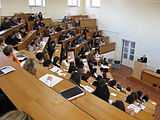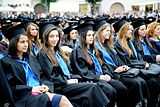Lucian Blaga University of Sibiu
| Lucian Blaga University of Sibiu | |
|---|---|
| Universitatea "Lucian Blaga" din Sibiu | |
 Logo Lucian Blaga University of Sibiu | |
| Motto | Mens Agitat Molem |
Motto in English | Mind moves matter |
| Established | 1990 |
| Type | Public |
| Rector | Prof.univ.dr.ing. Ioan Bondrea |
Academic staff | 881 |
| Students | 20,000[1] |
| Location | Sibiu, Romania |
| Website | http://www.ulbsibiu.ro |
The Lucian Blaga University of Sibiu (Romanian: Universitatea "Lucian Blaga" din Sibiu) is a public university in Sibiu, Romania. Named after the philosopher, poet, and playwright, Lucian Blaga, it was founded in 1990 with five schools: Letters, History and Law, Medicine, Food and Textile Processing Technology, Engineering and Sciences. Other schools were added later.
Academics
- Faculty of Agricultural Sciences, Food Industry and Environmental Protection
- Faculty of Economics
- Faculty of Engineering
- Faculty of Law
- Faculty of Letters and Arts
- Faculty of Medicine
- Faculty of Sciences
- Faculty of Social and Human Sciences
- Faculty of Theology
History

In a highly interconnected and interactive world, LBUS could keep in the mainstream of academic events only by promoting international cooperation. After 1992, the year which marked the beginning of Dr. Ciocoi-Pop’s administration, LBUS adopted a policy increasing its academic contacts and links. It was the leadership’s strong conviction that, among the forty-eight state universities, eight military academies and forty-nine private universities of Post-Revolutionary Romania, LBUS could be successful only by interaction and cooperation.
Consequently, LBUS has established academic links and partnership agreements with eighty-five universities in thirty-five countries. A special place is held by the partnerships drawn with American, German, French and English universities, which materialized in student exchange programmes, fact-finding data trips for academics as well as a precious cooperation which has kept the University tuned in to what happens in the world. Worth mentioning are also the new ties with Chinese, Russian, Italian, Greek and Polish Universities.
In cooperation with its partners abroad, LBUS has established a number of organizations for students. Among them, CAS and UBA hold a special place.
C.A.S. – The Career Advisory Service, founded in 1996, in cooperation with the British Council and supported by the Know How Fund, aims at establishing links between students, graduates and the job market. Its activity consists in offering students, graduates or employees daily consulting and in facilitating interviews in order to help them define their needs in employment and career. The centre organizes workshops, seminars and long-term courses. The Summer Job Fair, organized by C.A.S. each year, offers a great opportunity for students to meet employers and to get internships or full-time employment.
U.B.A. – The University Business Association, is a club which facilitates constant interchange among faculties, business people and students. The main purposes of the club are to assist students in developing business skills and contacts, English language skills, and to provide support in getting jobs and summer internships. The club is a result of collaborative program funded by the United States Information Agency (USIA). The Missouri University (MU) – Columbia, USA has assisted LBUS in developing a business school meant to be nationally recogni z ed as a centre of academic and research excellence in business management and applied research.
I.C. – The International Centre, Tübingen, is a consortium of 18 universities, in 8 countries, which have joined their efforts for the purpose of establishing and intensifying academic cooperation between Eastern and Western academics.
C.R.E. is the association of executive heads of universities in Europe. In the autumn of 1984, its membership was drawn from some 360 universities and equivalent institutes of higher education in 23 European countries. Since 1964, its headquarters have been situated at the University of Geneva. CRE’s main objective is to promote cooperation among European universities.
A.U.D.E.M. – The Alliance of Universities for Democracy, is a consortium of institutions of higher education formed to enhance the role of education in promoting democratic institutions, economic development, decentralized decision-making, human health, and common moral and social values. At its inception, the Alliance included institutions in Central and Eastern Europe and in 1993 the organization voted to expand membership to Western Europe institutions.
I.A.U.P. – The International Association of University Presidents, was founded in 1964 in Oxford, England. It is an association of university chief executive officers from higher education institutions around the world. Its primary purpose is to strengthen the international mission and quality of education of the member institutions in an increasingly interdependent world, and to promote global awareness and competence as well as peace and international understanding through education.
The European University Association (EUA), in its capacity as an organization of European Universities and National Associations of University Presidents, it functions as a speaker for the higher education community in Europe. EUA`s mission is to promote the development of a coherent system of European higher education and research. Since higher education institutions play an essential part in the development of European areas of higher education and research, the fundamental aim of EUA is to provide active support and guidance to its members as autonomous institutions in enhancing the quality of their teaching, learning and research as well as their contributions to society. The University Agency of Francophonie (AUF), headquartered at the campus of the University of Montreal (Canada-Quebec), was set up in 1961. AUF supports cooperation and solidarity among Francophone higher education institutions and it fosters the development of academic education and research. The University Network of the European Capitals of Culture (UNeECC), an international non-profit association, was founded in Pécs, Hungary, in December 2006, by 40 founding members.
The creation of UneECC originates from the idea that it would be useful for Universities and establishments of Higher Education in European Capitals of Culture to use this well-known and prestigious European institution, to stimulate new forms of academic and educational institutional collaboration.
Faculties
- Faculty of Agricultural Sciences, Food Industry and Environmental Protection
- Faculty of Economics (International Affairs, Finance-Banking, Marketing, Management, Economic informatics, Economics, Accounting and administration, Economy trade, tourism and services)
- Faculty of Engineering (Industrial Engineering, Mechanical Engineering, Mines, Oil and Gases, Engineering and Management, Computers and Information Technology, Electronic Engineering, Environment Engineering, Transportation Engineering, Applied Science and Engineering, Systems Engineering, Electronic Engineering and Telecommunication)
- Faculty of Law (Law, Public Administration, Community Police)
- Faculty of Letters and Arts (Romanian Language and Literature, Applied Modern Languages, Sciences of Commnunication, Theatre)
- Faculty of Medicine (Medicine, Dental Medicine, Health Care, Dental Tehnique, Dental Care)
- Social and Human Sciences (International Relations, Political Science, Security Studies, History, Heritage, Protestant Theology, Journalism, Public Relations, Sociology, Psychology)
- Faculty of Sciences (Mathematics, Informatics, Ecology and Environment Protection, Biology, Physics, Physical Education and Sports)
- Faculty of Theology (Pastoral Theology, Teaching Theology, Social Theology)
The University Department of Distance Learning
Faculty of Economics

Continuing the long cultural and economic tradition in this century-old Romanian region, “Lucian Blaga” University of Sibiu, proving a remarkable sense of equilibrium, has chosen, in a first phase, to set up a Faculty of Economics and later to develop it both quantitatively and qualitatively.
Although the Faculty of Economics is relatively new, as compared to other faculties in Sibiu, its main goal is a development characterized by innovation, dynamism, rigour and quality, thus being in full accord with the ever-higher demands of the national and European academic environment.
The Faculty of Economics offers flexible, attractive and rich educational opportunities and, due to the high quality academic training provided here, meets the present and future demands and requirements of the Romanian economy and society.
The Faculty of Economics encourages professionalism, initiative, motivation, responsibility and competence. Thus, the faculty promotes professional training and improvement programmes comparable to those provided by prestigious national and international universities, in accordance with the requirements for Romania’s integration in the European Union.
Faculty of Engineering

The school of engineering was established in 1976, as the Institute of Superior Education. In 1986 it was transformed into the Sub-Engineering Institute, subordinated to the Technical University of Cluj-Napoca.
In 1990, the Institute of Superior Education changes its name to "Lucian Blaga" University of Sibiu, and the Mechanical Faculty became the School of Engineering.
Honoring the technical contributions of Hermann Oberth, the famous rocket scientist born in Sibiu, the Engineering Faculty adopted his name, and now is called the "Hermann Oberth" School of Engineering. Some of the most prestigious professors who taught here are: Ilie Isarie, Graţian Şteţiu, Dan Nanu, and more recently Constantin Oprean (the actual rector of "Lucian Blaga" University, 2004), Dan Maniu-Duşe, Dan Paul Brândaşu, Lucian Vintan,[2] and Octavian Bologa.
Students have now the opportunity to choose from a wide range of technical specializations: Industrial Engineering, Economical Engineering, Environmental Engineering, Transportation Engineering, Computer Science and Computer Engineering, Textile Engineering and Transportation, Distribution and Storage of Hydrocarbures. After graduation, students have the opportunity to continue their studies with post-graduate and doctoral programs in Quality Management, Manufacturing Management, Computer Science, Human Resource Management, Natural Gas Valorification and Advanced CAD Technologies.
Faculty of Social and Human Sciences
The school of journalism was established in 1992 and accredited within three years for its high standards in education. In 2001 it was extended with new degree programs: Communication Sciences and Public Relations, as well as Philosophy. Students have the opportunity to continue their studies with post-graduate programs in Communication Sciences and Publishing, Journalism and Public Relations, Culture and Communication.
Faculty of Theology
The faculty of theology is the oldest one in Sibiu.
Gallery
|
References
External links
Coordinates: 45°47′26″N 24°08′45″E / 45.790509°N 24.145728°E




